- Home
- Julia Quinn
Just Like Heaven
Just Like Heaven Read online
Just Like Heaven
Julia Quinn
Dedication
For Pam Spengler-Jaffee.
You are a goddess in every way.
And also for Paul,
even though when I went to him
for medical advice to save my ailing hero,
he replied, “He has to die.”
Contents
Cover
Title Page
Dedication
Prologue
Chapter One
Chapter Two
Chapter Three
Chapter Four
Chapter Five
Chapter Six
Chapter Seven
Chapter Eight
Chapter Nine
Chapter Ten
Chapter Eleven
Chapter Twelve
Chapter Thirteen
Chapter Fourteen
Chapter Fifteen
Chapter Sixteen
Chapter Seventeen
Chapter Eighteen
Chapter Nineteen
Chapter Twenty
Chapter Twenty-one
Chapter Twenty-two
Chapter Twenty-three
Epilogue
About the Author
By Julia Quinn
Copyright
About the Publisher
Prologue
Marcus Holroyd was always alone.
His mother died when he was four, but this had surprisingly little effect on his life. The Countess of Chatteris mothered her son the way her mother had mothered her children—from afar. She was not irresponsible; she took great care and pride in finding the very best baby nurse for her husband’s new heir. Miss Pimm was on the darker side of fifty and had already cared for two ducal heirs and a viscount. Lady Chatteris placed her baby into Pimm’s arms, reminded the nurse that the earl could not tolerate strawberries and thus it was likely that the baby could not either, and then left to enjoy the London season.
At the time of her death, Marcus had seen his mother on precisely seven occasions.
Lord Chatteris was more fond of country life than his wife and was more frequently in residence at Fensmore, the great big rambling Tudor house in northern Cambridgeshire that had been home to the Holroyds for generations. But he fathered his son the way his father had fathered him. Which was to say that other than making sure the child was put atop a horse at the age of three, he didn’t see any reason to bother with him until the boy was old enough to conduct a reasonably intelligent conversation.
The earl did not wish to remarry, even though he was warned that he ought to get himself a spare to go along with his heir. He looked at Marcus and saw a boy of good intelligence, excellent athleticism, and passable looks. Most importantly, he was as healthy as a horse. With no cause to suppose that Marcus might kick up and die, the earl saw no reason to subject himself to another round of wife-hunting, or even worse, another wife. He chose instead to invest in his son.
Marcus had the best tutors. He was schooled in every possible corner of a gentleman’s education. He could name all the local fauna and flora. He could ride like he’d been born to a saddle, and if his fencing and shooting weren’t going to win any competitions, he was still well above average. He could do lengthy products and sums without even a drop of wasted ink. He could read Latin and Greek.
By the age of twelve.
Which was, perhaps coincidentally, about the age his father decided he might be able to carry on a decent conversation.
It was also the age at which his father decided that Marcus must take the next step in his education, which was to leave Fensmore and attend Eton College, where all Holroyd boys began their formal educations. This turned out to be the most fortuitous and happy circumstance of the young boy’s life. Because what Marcus Holroyd, heir to the Earldom of Chatteris, did not have was friends.
Not a one.
There were no appropriate boys in northern Cambridgeshire with whom Marcus might play. The closest noble family were the Crowlands, and they had only girls. The next best family was landed gentry, which would have been acceptable under the circumstances, but their sons were of entirely the wrong age. Lord Chatteris wasn’t about to have his son consorting with peasants, so he simply hired more tutors. A busy boy couldn’t be a lonely boy, and besides, no son of his could possibly want to run wild across the fields with the baker’s rowdy brood.
If the earl had asked Marcus his opinion, he might have got a different answer. But the earl saw his son once per day, just prior to the evening meal. Their interview lasted about ten minutes, then Marcus went up to the nursery and the earl to his formal dining room, and that was that.
In retrospect, it was nothing short of remarkable that Marcus was not utterly miserable at Eton. He certainly had no idea how to interact with his peers. On the first day, when all the other boys were running about like (in the words of his father’s valet, who had dropped him off) a pack of savages, Marcus stood to the side, trying not to stare, trying to look as if he meant to stand at the side, looking off in the other direction.
He did not know how to act. He did not know what to say.
But Daniel Smythe-Smith did.
Daniel Smythe-Smith, besides being the heir to the Earldom of Winstead, had five siblings and thirty-two first cousins. If ever there was a boy who knew how to get on with other children, it was he. Within hours, he was the undisputed king among the youngest boys at Eton. He had a way about him—an easy smile, a happy confidence, an utter lack of shyness. He was a born leader—able to make decisions just as quickly as he made jokes.
And he was assigned to the bed directly next to Marcus’s.
They became the best of friends, and when Daniel invited Marcus home for their first holiday, he went. Daniel’s family lived at Whipple Hill, which wasn’t very far from Windsor, so it was easy for him to make frequent trips home. Marcus, on the other hand . . . Well, it wasn’t as if he lived all the way in Scotland, but it did take more than a day to get back to the northern reaches of Cambridgeshire. Plus, his father had never gone home for the minor holidays and saw no reason why his son should do so, either.
So when the second holiday came up, and Daniel invited Marcus again, he went.
And then again.
And again.
And again until Marcus was spending more time with the Smythe-Smiths than he did with his own family. Of course, his family consisted of exactly one person, but still, if Marcus stopped to think about it (and he did, quite frequently) he spent more time with each individual member of the Smythe-Smith family than he did with his father.
Even Honoria.
Honoria was Daniel’s youngest sister. Unlike the rest of the Smythe-Smiths, she had no siblings close to her own age. She hung off the end of the family by a good five years, a presumably happy accident to cap off Lady Winstead’s marvelous procreative career.
But five years was a large gulf, especially if one was but six years old, which was Honoria’s age when Marcus first met her. Her three oldest sisters were already married or engaged to be, and Charlotte, who was eleven, wanted nothing to do with her. Neither did Daniel, but absence must have made Honoria’s heart grow ridiculously fond, because when he was home from school, she followed him around like a puppy.
“Don’t make eye contact,” Daniel once told Marcus as they were trying to avoid her on a hike down to the lake. “If you acknowledge her, it’s all over.”
They walked purposefully, heads forward. They were going fishing, and the last time Honoria had joined them she had dumped out all the worms.
“Daniel!” she yelled.
“Ignore her,” Daniel muttered.
“Daniel!!!!!!!!!!!!” She went from yell right to shriek.
Daniel flinche
d. “Faster,” he said. “If we make it to the woods she won’t find us.”
“She knows where the lake is,” Marcus felt compelled to point out.
“Yes, but—”
“Daniel!!!!!!!!!!!!”
“—she knows Mother will have her head if she goes into the woods alone. Even she’s not foolish enough to press Mother on that.”
“Dan—” But she cut herself off. And then, in a voice so pathetic one could not help but turn, she said, “Marcus?”
He turned.
“Noooooooooooooo!” Daniel moaned.
“Marcus!” Honoria called out happily. She skipped forward, coming to a bounce and a stop in front of them. “What are you doing?”
“We’re going fishing,” Daniel growled, “and you’re not coming.”
“But I like to fish.”
“So do I. Without you.”
Her face screwed up.
“Don’t cry,” Marcus said quickly.
Daniel was unimpressed. “She’s faking.”
“I’m not faking!”
“Just don’t cry,” Marcus repeated, because truly, that had to be the most important thing.
“I won’t,” she said, batting her lashes, “if you let me go with you.”
How did a six-year-old know how to bat her lashes? Or maybe she didn’t, because a moment later she was squirming and rubbing her eye.
“Now what’s wrong?” Daniel asked.
“I got something in my eye.”
“Maybe it was a fly,” Daniel said slyly.
Honoria screamed.
“That might not have been the best thing to say,” Marcus pointed out.
“Get it out! Get it out!” she shrieked.
“Oh, settle down,” Daniel said. “You’re perfectly fine.”
But she kept screaming, batting at her face with her hands. Finally Marcus grabbed her hands in his and held her head utterly still, her hands at her temples, his hands over hers. “Honoria,” he said firmly, “Honoria!”
She blinked, gasped, and finally stilled.
“There is no fly,” he said to her.
“But—”
“It was probably an eyelash.”
Her mouth formed a little O.
“Can I let go of you now?”
She nodded.
“You won’t start screaming?”
She shook her head.
Slowly, Marcus released her and took a step back.
“Can I come with you?” she asked.
“No!” Daniel practically howled.
And the truth was, Marcus didn’t really want her company, either. She was six. And a girl. “We’re going to be very busy,” he said, but he lacked Daniel’s indignation.
“Please?”
Marcus groaned. She looked so forlorn, standing there with tear-stained cheeks. Her light-brown hair, parted on the side and pulled back with some kind of clip, hung rather straight and limp, ending in straggle just below her shoulders. And her eyes—almost the exact shade of Daniel’s, an arrestingly unique shade of light purplish-blue; they were huge, and wet, and—
“I told you not to make eye contact,” Daniel said.
Marcus groaned. “Maybe just this once.”
“Oh, goody!” She leapt straight up into the air, bringing to mind a surprised cat, then gave Marcus an impulsive (but thankfully quick) hug. “Oh, thank you, Marcus! Thank you! You are the absolute best! The best of the best!” She narrowed her eyes and shot a look over at Daniel that was frighteningly adult. “Unlike you.”
His expression was equally malevolent. “I take pride in being the absolute worst.”
“I don’t care,” she announced. She grabbed Marcus’s hand. “Shall we go?”
He looked down at her hand in his. It was an utterly foreign sensation, and a strange and somewhat unpleasant feeling began to flutter in his chest that he belatedly realized was panic. He couldn’t remember the last time anyone had held his hand. His nurse, maybe? No, she had liked to grab his wrist. She got a better grip that way, he once heard her tell the housekeeper.
Had his father? His mother, sometime before she had died?
His heart pounded, and he felt Honoria’s little hand grow slick in his. He must be sweating, or she was, although he was fairly certain it was he.
He looked down at her. She was beaming up at him.
He dropped her hand. “Er, we have to go now,” he said awkwardly, “while the light is good.”
Both Smythe-Smiths looked at him curiously. “It’s barely noon,” Daniel said. “How long did you want to go fishing?”
“I don’t know,” Marcus said defensively. “It might take a while.”
Daniel shook his head. “Father just stocked the lake. You could probably swing a boot through the water and catch a fish.”
Honoria gasped with glee.
Daniel turned on her in an instant. “Don’t even think about it.”
“But—”
“If my boots end up anywhere near the water I swear I will have you drawn and quartered.”
She pouted and looked down, muttering, “I was thinking about my boots.”
Marcus felt a little laugh bubble over his lips. Honoria immediately looked back up, regarding him with an expression of utter betrayal.
“It would have to be a very small fish,” he said quickly.
This did not seem to satisfy her.
“You can’t eat them when they’re that small,” he tried. “They’re mostly bones.”
“Let’s go,” Daniel muttered. And they did, tramping off through the woods, Honoria’s little legs pumping at double speed, just to keep up.
“I’m not fond of fish, actually,” she said, keeping up a steady stream of chatter. “They smell horrid. And they taste fishy . . .”
And then, on the way back—
“. . . I still think that pink one looked big enough to eat. If you liked fish, which I don’t. But if you did like fish . . .”
“Do not ever invite her to come with us again,” Daniel said to Marcus.
“. . . which I don’t. But I think Mother likes fish. And I am sure she would like a pink fish . . .”
“I won’t,” Marcus assured him. It seemed the height of rudeness to criticize a little girl, but she was exhausting.
“. . . although Charlotte wouldn’t. Charlotte hates pink. She won’t wear it. She says it makes her look gaunt. I don’t know what gaunt means, but it sounds unpleasant. I like lavender, myself.”
The two boys let out identical sighs and would have kept walking except that Honoria jumped in front of them and grinned. “It matches my eyes,” she said.
“The fish?” Marcus asked, glancing down at the bucket in his hand. There were three nice-sized trout bumping up against the sides. There would have been more, except that Honoria had accidentally kicked the bucket, sending Marcus’s first two prizes back into the lake.
“No. Haven’t you been listening?”
Marcus would always remember that moment. It was to be the first time he would ever be faced with that most vexing of female quirks: the question that had nothing but wrong answers.
“Lavender matches my eyes,” Honoria said with great authority. “My father told me so.”
“Then it must be true,” Marcus said with relief.
She twirled her hair around her finger, but the curl immediately fell out when she let go. “Brown matches my hair, but I prefer lavender.”
Marcus finally set the bucket down. It was growing heavy, and the handle was digging into his palm.
“Oh, no,” Daniel said, grabbing Marcus’s bucket with his free hand and giving it back to Marcus. “We are going home.” He glared at Honoria. “Out of our way.”
“Why are you nice to everyone but me?” she asked.
“Because you are a pest!” he fairly yelled.
It was true, but Marcus still felt sorry for her. Some of the time. She was practically an only child, and he knew precisely how that felt. All she wanted was to be
a part of things, to be included in games and parties and all those activities her family was constantly telling her she was too young for.
Honoria took the verbal blow without flinching. She stood still, staring venomously at her brother. Then she sucked in one long, loud breath through her nose.
Marcus wished he had a handkerchief.
“Marcus,” she said. She turned to face him, although it really wasn’t so much that as it was turning her back on her brother. “Would you like to have a tea party with me?”
Daniel snickered.
“I will bring my best dolls,” she said with complete gravity.
Dear God, anything but this.
“And there will be cakes,” she added, in a prim little voice that scared him to death.
Marcus shot a panicked look at Daniel, but he was no help whatsoever.
“Well?” Honoria demanded.
“No,” Marcus blurted out.
“No?” She gave him an owlish stare.
“I can’t. I’m busy.”
“Doing what?”
Marcus cleared his throat. Twice. “Things.”
“What kinds of things?”
“Things.” And then he felt terrible, because he hadn’t meant to be so adamant. “Daniel and I have plans.”
She looked stricken. Her lower lip began to tremble, and for once Marcus did not think she was faking.
“I’m sorry,” he added, because he hadn’t wanted to hurt her feelings. But for heaven’s sake, it was a tea party! There wasn’t a twelve-year-old boy alive who wanted to attend a tea party.
With dolls.
Marcus shuddered.
Honoria’s face grew red with rage as she swung around to face her brother. “You made him say that.”
“I didn’t say a word,” Daniel replied.
“I hate you,” she said in a low voice. “I hate you both.” And then she yelled it. “I hate you! Especially you, Marcus! I really hate you!”
And then she ran to the house as fast as her skinny little legs could carry her, which wasn’t very fast at all. Marcus and Daniel just stood there, silently watching her go.
When she was nearly to the house, Daniel nodded and said, “She hates you. You are officially a member of the family.”
And he was. From that moment on, he was.

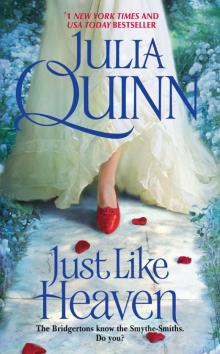 Just Like Heaven
Just Like Heaven B03.2 An Offer from a Gentleman Ep II
B03.2 An Offer from a Gentleman Ep II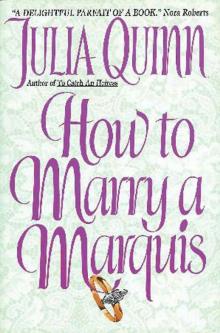 How to Marry a Marquis
How to Marry a Marquis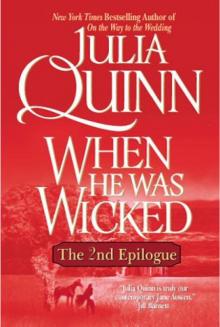 When He Was Wicked: The 2nd Epilogue
When He Was Wicked: The 2nd Epilogue Ten Things I Love About You
Ten Things I Love About You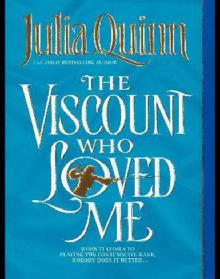 The Viscount Who Loved Me
The Viscount Who Loved Me The Duke and I
The Duke and I B05.2 To Sir Philip With Love Ep II
B05.2 To Sir Philip With Love Ep II An Offer From a Gentleman: The 2nd Epilogue
An Offer From a Gentleman: The 2nd Epilogue Minx
Minx On the Way to the Wedding with 2nd Epilogue
On the Way to the Wedding with 2nd Epilogue Mr. Cavendish, I Presume
Mr. Cavendish, I Presume A Night Like This
A Night Like This Splendid
Splendid Everything and the Moon
Everything and the Moon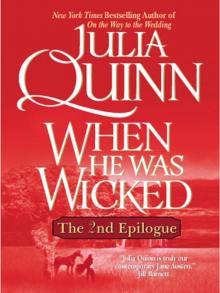 When He Was Wicked
When He Was Wicked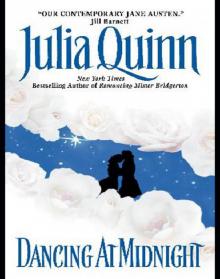 Dancing at Midnight
Dancing at Midnight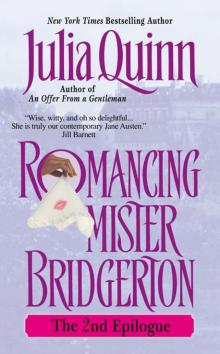 Bridgerton 04: 2nd Epilogue - Romancing Mister Bridgerton
Bridgerton 04: 2nd Epilogue - Romancing Mister Bridgerton The Lost Duke of Wyndham
The Lost Duke of Wyndham To Sir Phillip, With Love
To Sir Phillip, With Love It's in His Kiss
It's in His Kiss The Other Miss Bridgerton
The Other Miss Bridgerton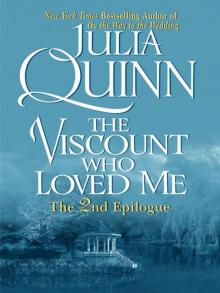 Bridgerton 02: 2nd Epilogue - The Viscount Who Loved Me
Bridgerton 02: 2nd Epilogue - The Viscount Who Loved Me The Secrets of Sir Richard Kenworthy
The Secrets of Sir Richard Kenworthy On the Way to the Wedding
On the Way to the Wedding The Secret Diaries of Miss Miranda Cheever
The Secret Diaries of Miss Miranda Cheever Because of Miss Bridgerton
Because of Miss Bridgerton What Happens in London
What Happens in London JQuinn - The Secret Diaries of Miss Miranda Cheever
JQuinn - The Secret Diaries of Miss Miranda Cheever The Girl With the Make-Believe Husband
The Girl With the Make-Believe Husband First Comes Scandal
First Comes Scandal To Catch an Heiress
To Catch an Heiress The Sum of All Kisses
The Sum of All Kisses An Offer From a Gentleman
An Offer From a Gentleman The Bridgertons: Happily Ever After
The Bridgertons: Happily Ever After Bridgerton Collection Volume 1 (Bridgertons)
Bridgerton Collection Volume 1 (Bridgertons)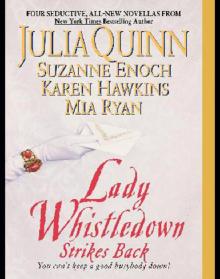 Lady Whistledown Strikes Back
Lady Whistledown Strikes Back Secret Diaries of Miss Miranda Cheever
Secret Diaries of Miss Miranda Cheever An Offer from a Gentleman with 2nd Epilogue
An Offer from a Gentleman with 2nd Epilogue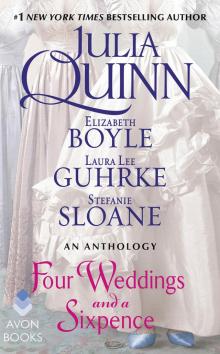 Four Weddings and a Sixpence
Four Weddings and a Sixpence An Offer from a Gentleman: The Epilogue II
An Offer from a Gentleman: The Epilogue II The Further Observations of Lady Whistledown
The Further Observations of Lady Whistledown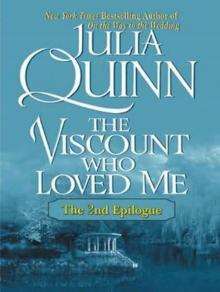 The Viscount Who Loved Me: The Epilogue II
The Viscount Who Loved Me: The Epilogue II It’s In His Kiss Epilogue II
It’s In His Kiss Epilogue II To Sir Phillip, with Love: The Epilogue II
To Sir Phillip, with Love: The Epilogue II The Secret Diaries of Miss Miranda Cheevers
The Secret Diaries of Miss Miranda Cheevers A Night Like This (Smythe-Smith Quartet)
A Night Like This (Smythe-Smith Quartet)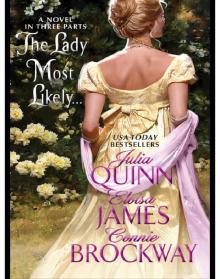 The Lady Most Likely...
The Lady Most Likely...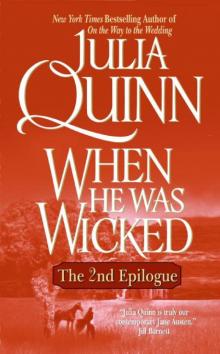 Bridgerton 06: 2nd Epilogue - When He Was Wicked
Bridgerton 06: 2nd Epilogue - When He Was Wicked Just Like Heaven sq-1
Just Like Heaven sq-1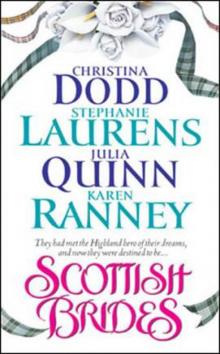 Gretna Greene
Gretna Greene